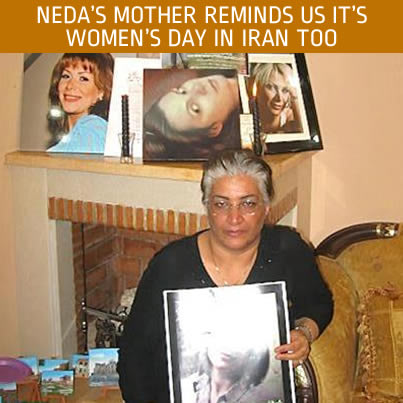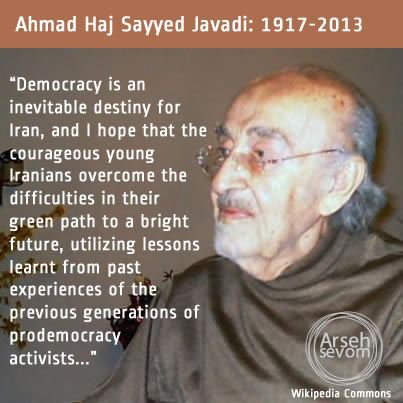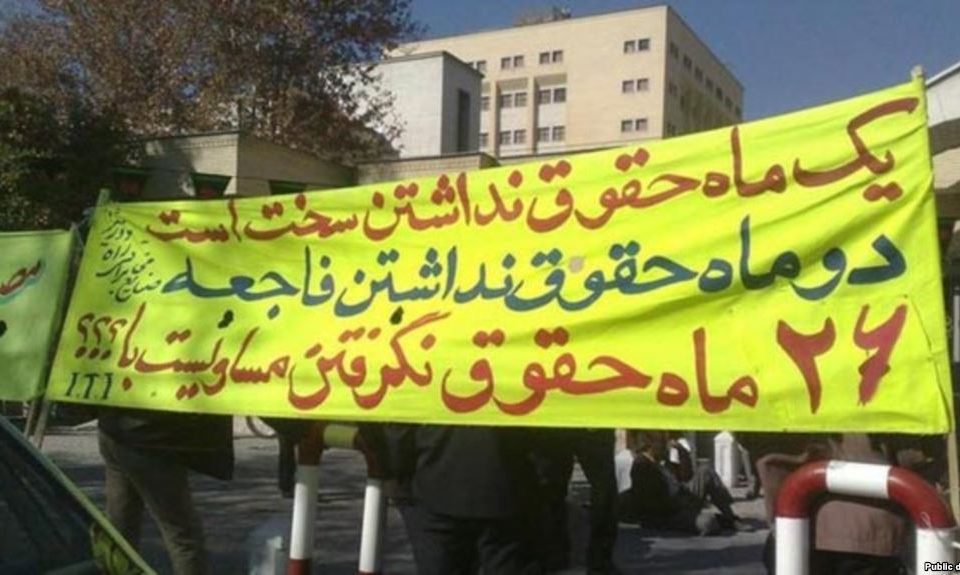
Iran: Under Pressure Society Struggles
March 8, 2013
Iran’s Military-Electoral Quagmire
April 16, 2013Arseh Sevom — With election season on the horizon, speculation begins about likely candidates while officials create an atmosphere of insecurity with rumors and fear mongering. Civil society actors in Khuzestan are rounded up. The family of a former framer of Iran’s constitution is told that there can be no public gathering for his funeral. Iran’s Education Minister lobbies for segregated university classrooms leaving some asking “What’s next? Divided hallways?” Economic woes are nothing new in Iran with inflation at 31.5%, yet the market is flooded with cheap fruit. This month Iran became the worst economy in the Mideast and the country with the second highest rate of traffic fatalities. So much for the good news folks.
Election and Its Discontents
Who will be the next president of Iran? It’s hard to tell when just four months before his inauguration, candidates remain unannounced. Despite very public run-ins with traditional forces in Iran, Mahmoud Ahmadinejad and his controversial chief of staff, Rahim Mashaei are not ready to cede their hold on power.
Writing for Tehran Bureau, Gareth Smyth outlines the machinations that could lead to a Mashaei candidacy. The New York Times’s Thomas Erdbrink also looks at what is at stake for Ahmadinejad and the Principlists if they are shut out from power, writing:
“But this time, the jockeying for power is more than politics as usual. If the president and his supporters fail, they will lose any claim to immunity from prosecution and find themselves at the mercy not only of the judiciary but also of the country’s security forces, state television and influential Friday Prayer leaders, all controlled by the traditionalists.”
The official policy seems to be to create an atmosphere of fear and insecurity around the upcoming election season. The Islamic government has created a kind of unsecure space — kind of stressful. Digarban [fa] reports that the commander of the Basij paramilitary forces, Mohammad Reza Naghdi stated that some non-specific enemy of Iran had plans to create chaos during the upcoming elections. He claimed that “the enemy had wide ranging plans to sabotage the… [elections], the media, and our political system…”
Naghdi went as far as to claim that “the enemy” had plans to kill 92 people during the upcoming elections.
Instead of creating a healthy sphere for the elections, the official mouthpieces of the Islamic Republic of Iran have been spreading rumors and creating fear.
A Wave of Arrests in Khuzestan
Radio Zamaneh reports that in the past month at least 160 civil society actors have been arrested throughout Khuzestan. A number of them may have been released on bail already, yet many remain unaccounted for.
No Public Funeral for the First Post-Revolution Interior Minister
Ahmad Sayyed Javadi, who died at the age of 95, was buried in a private ceremony after his family was prevented from holding the funeral in a mosque. During the time of the Shah, he served as a lawyer for Ali Khamenei, the current Supreme Leader, and other prominent dissidents.
The family was warned that they could have no eulogies or discussion at the ceremony. His daughter was forced to sign a document agreeing to the demands of the government. In an interview with Rooz Online [fa], his brother, Ali Asghar, said of the government, “They are afraid even of funerals and ceremonies for the dead.”
In a letter addressed to the people of Iran, Javadi apologized for his role in bringing about the Islamic Republic. He wrote:
“The path ahead of us was difficult and, at times, we made mistakes. However, at this time, with all my senility and exhaustion, I am confident and hopeful about the victory of democracy and freedom of the people of Iran, more than any other times in history. Democracy is an inevitable destiny for Iran, and I hope that the courageous young Iranians overcome the difficulties in their green path to a bright future, utilizing lessons learnt from past experiences of the previous generations of prodemocracy activists, and through their perseverance in pursuing their goals, their patience and reliance on God.”
Segregation in the Universities
Separate classes for college bound men and women? Kamran Danseshjou, the aptly named Minister of Education, insists that gender segregation at the university level is a good idea. He is quoted in BBC Persian:
“We say we create single-sex university for those who wish to be separated. In a word, we need a university that is in sync with Iran’s Islamic culture.”
Jafar Towfighi former Minister of Science, Research and Technology calls the new policy a “cultural disaster” and insulting.
“The moral atmosphere in the universities is excellent…” he stated.
Many people and organizations have come out against the segregation plan.
ILNA [fa] reports on the reaction of the head of Parliament’s Planning and Budget Commission, Gholam Reza Mesbahi, to bad economic news. Mesbahi stated that Iran’s economic growth is now at zero, stating, “It is a shame we didn’t use all of the economic opportunities available to us.”
International sanctions and a misguided government subsidy program have contributed to the bad economy, he added.
Mardomak reports that according to the Center of Iranian Statistics, the rate of inflation over the past month was 31.5%. Food prices are 60% higher than this time last year, giving Iran the dubious distinction of having the worst economy in the Middle East.
During the Norooz (new year) holidays, Iran’s markets were flooded with gorgeous mandarins and other fruit at low prices. This was an unexpected and unexplained treat for many Iranians who were used to prohibitive prices.
Unfortunately, as Iran Emrooz [fa] reports, this treat came with a price. Reportedly, the fruit was meant for export to Arab countries. It was rejected when tests showed an unacceptable level of pesticides.
The same thing is reported to have happened in the past with chicken exports.
This has caused many in Iran to start questioning the lack of food quality standards.
Out of 190 countries, Iran is #2 when it comes to the highest rate of traffic fatalities. The only country with more is Sierra Leone.
UNICEF reports that the rate of accidents in Iran is twenty times the world average. Each year they leave 28,000 dead and 300,000 injured or disabled.
There was an increase in number of traffic accidents over the New Year holidays: with nearly 32,000 injured during the two week holiday.
Break
The weekly review will be a bit sporadic in the coming weeks due to vacations and other obligations. If you have a story you’d like us to follow, leave a comment or use the form on our site.





